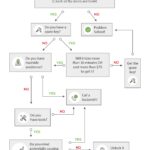If you’re wondering about the optimal time to refinance your auto loan, you’re not alone. Many car owners consider refinancing to potentially lower their monthly payments, reduce interest rates, or adjust loan terms. Knowing when to refinance your car can save you a significant amount of money and help you manage your finances more effectively. This article will guide you through the best times to refinance your car loan and when it might be better to wait.
When Refinancing Your Car Loan Makes Sense
The decision to refinance your car loan isn’t always straightforward, and timing plays a crucial role. Several factors can indicate that now is a good time to consider refinancing. Let’s explore some key scenarios where refinancing can be advantageous.
Capitalize on an Improved Credit Score
Your credit score is a primary factor in determining the interest rate you receive on any loan, including car loans. Lenders categorize applicants based on credit score tiers, and a better credit score generally translates to a lower Annual Percentage Rate (APR). If you’ve diligently worked to improve your credit score since you initially took out your car loan, refinancing could unlock access to significantly more favorable terms.
A higher credit score signals lower risk to lenders, making them more willing to offer lower interest rates. Securing a lower APR through refinancing can lead to substantial savings over the life of your loan.
For example, consider refinancing a $15,000 loan. Dropping your interest rate from 7% to 5% on a three-year term could save you approximately $1,500 in interest. The table below illustrates the impact of credit scores on interest paid over a five-year $25,000 loan:
Lifetime Interest Charges on a $25,000 Loan
| Credit Score | Average APR | Total Interest Paid |
|---|---|---|
| 781-850 | 5.08% | $3,362 |
| 661-780 | 6.70% | $4,490 |
| 601-660 | 9.73% | $6,672 |
| 501-600 | 13.00% | $9,130 |
| 300-500 | 15.43% | $11,024 |
Source: Experian’s State of the Automotive Finance Market Q3 2024
Alt: Table comparing total interest paid on a $25,000 car loan across different credit score ranges and average APRs, highlighting potential savings from a better credit score.
Adjusting Your Loan Term to Fit Your Financial Situation
Life circumstances change, and your car loan should ideally adapt to your current financial reality. Refinancing offers the flexibility to modify your loan term, whether you need to lower your monthly payments or accelerate your payoff schedule.
If you’re facing financial strain, perhaps due to job loss or unexpected expenses, extending your loan term through refinancing can reduce your monthly payments. However, it’s crucial to remember that while a longer term provides immediate payment relief, it will increase the total interest you pay over the loan’s duration.
Conversely, if your income has increased, refinancing to a shorter loan term can help you pay off your car loan faster and save significantly on interest. For instance, shortening a 72-month loan to 48 months on a $15,000 auto loan at 8.5% APR could save you over $3,800 in total interest charges, although your monthly payments will be higher.
Taking Advantage of Lower Interest Rates in the Market
Interest rates for auto loans are not static; they fluctuate based on economic conditions. If market interest rates have decreased since you initially financed your car, refinancing can be a smart move. Even a slight reduction in APR can lead to considerable savings over the loan term, even if your credit score remains unchanged.
Monitoring trends in auto loan rates is essential. Websites that track auto loan statistics can provide insights into average car payments and rate changes, helping you identify favorable refinancing opportunities.
Leveraging Positive Equity in Your Vehicle
Positive equity occurs when your car is worth more than the outstanding balance on your loan. Having positive equity can make you a more attractive borrower to lenders, potentially leading to better refinance rates. Lenders view loans with positive equity as less risky.
To determine your loan-to-value ratio and assess your equity position, contact your current lender for your loan balance and estimate your car’s current market value. Resources like Kelley Blue Book and dealership listings can help you gauge your car’s value accurately.
Switching to a More Satisfactory Lender
Sometimes, the desire to refinance isn’t solely about rates or terms; it’s about lender experience. Poor customer service, inefficient record-keeping, or general dissatisfaction with your current lender can be valid reasons to seek refinancing.
Refinancing provides an opportunity to switch to a lender that better meets your needs and preferences. Online marketplaces can help you compare multiple lenders simultaneously, making it easier to find a lender that offers both competitive rates and a positive customer experience.
Be cautious of refinance add-ons, like extended warranties or GAP insurance, which lenders might push. While they may seem appealing by slightly reducing your monthly payment compared to your current situation, they often add significant costs that erode your refinance savings. Always research the necessity and value of such add-ons independently.
When to Hold Off on Refinancing Your Car Loan
While refinancing can be beneficial in many situations, there are instances where it’s not the right financial move. Understanding when to avoid refinancing is just as important as knowing when to pursue it.
When Your Credit Score Has Declined
If your credit score has worsened since you originally financed your car, refinancing might not yield favorable results. A lower credit score signals higher risk to lenders, potentially leading to higher interest rates or even rejection of your refinance application.
Focus on improving your credit score first before considering refinancing. Strategies like consistent on-time payments and reducing credit utilization can help boost your score. In urgent situations, a car loan cosigner might be an option, but it’s generally better to wait until your credit improves to secure better terms independently.
While some lenders specialize in refinancing car loans for individuals with bad credit, these loans often come with higher interest rates and less favorable terms. Carefully evaluate the total cost and long-term implications before refinancing with bad credit.
Refinancing an Older Vehicle
Lenders often impose age and mileage restrictions on vehicles they are willing to refinance. If your car is 10 years old or older, finding a lender willing to refinance might be challenging. Older vehicles are perceived as higher risk due to potential maintenance and depreciation concerns.
If you need to access funds for an older car, consider alternatives like personal loans, which are often more flexible regarding vehicle age, or explore trading in your older car for a newer model with better financing options.
If You’re Upside Down on Your Loan
Being “upside down” or having negative equity means you owe more on your car loan than your car is currently worth. Refinancing an upside-down car loan can be difficult, and even if you find a lender, the interest rate is likely to be higher to compensate for the increased risk. This will increase your overall borrowing costs.
To overcome this, consider paying down the difference in cash to reduce your loan balance and eliminate the negative equity. This will improve your loan-to-value ratio and make you eligible for better refinance rates.
Refinancing Too Soon After Original Purchase
While technically possible to refinance shortly after buying a car, it’s generally not advisable to refinance within the first six months to a year of ownership. Several factors contribute to this recommendation.
Firstly, it takes time for your credit score to fully reflect responsible payment behavior on the new loan. Secondly, cars typically depreciate most significantly in the initial months after purchase. Waiting allows some depreciation to occur and for your payment history to be established.
Unless there are compelling reasons to refinance immediately, such as significantly improved credit or drastically lower market rates, waiting at least six months to a year is usually the prudent approach. It’s crucial to ensure affordability before the initial car purchase to avoid needing to refinance prematurely.
When Approaching Loan Payoff
If you are nearing the end of your car loan term and are close to paying it off, refinancing might not be financially worthwhile. Most auto loans use a simple interest model, where interest is front-loaded. As you progress through your loan term, a larger portion of each payment goes towards the principal, and less towards interest.
Refinancing at this stage could reset the interest payment structure, potentially leading you to pay more interest overall over the life of a new refinance loan, even if the rate is slightly lower.
Loans with Prepayment Penalties
Some auto loans, though less common now, include prepayment penalties. These are fees charged by lenders if you pay off your loan before the agreed-upon term. If your current loan has a prepayment penalty, carefully calculate whether the savings from refinancing outweigh the cost of the penalty. Review your original loan documents to check for any prepayment penalty clauses.
Is Car Loan Refinancing Worth It?
Determining if refinancing is “worth it” depends on your individual financial goals and circumstances. If refinancing can secure you a lower interest rate, reduce your monthly payments, or shorten your loan term while saving you money overall, it’s likely a worthwhile endeavor.
Utilize an auto refinance calculator to estimate potential savings. Compare your current loan terms with potential refinance offers to make an informed decision. Refinancing is often driven by the need to lower monthly payments due to financial pressures. Balancing immediate financial needs with long-term financial goals is key to making the right decision for you and your family.
Steps to Refinance Your Car Loan
Refinancing your car loan involves a straightforward process. Here are the key steps to prepare and execute a successful refinance:
- Assess Your Affordability: Before applying, review your budget and determine your comfortable monthly payment range. Evaluate if refinancing aligns with your financial goals and provides tangible benefits.
- Gather Necessary Documentation: Prepare documents to verify your identity and financial situation. This typically includes your driver’s license, Social Security number, pay stubs or bank statements, Vehicle Identification Number (VIN), and current loan information (account number and outstanding balance).
- Compare Lender Rates: Shop around and compare offers from multiple lenders. Don’t settle for the first offer. Get pre-approved for car refinance loans from several lenders to compare APRs, loan terms, monthly payments, and any associated fees or penalties.
- Finalize Your Loan: Once you’ve chosen the best offer, submit a formal loan application. Carefully review the loan agreement before signing, paying close attention to all terms and conditions. After closing, your first payment is usually due within 30 days.
Frequently Asked Questions about Car Refinancing
How soon after buying a car can you refinance?
While there’s no strict waiting period, it’s generally recommended to wait at least 6 to 12 months after purchasing your car before refinancing. This allows time for title transfer, credit score improvement, and depreciation to stabilize.
Does refinancing hurt your credit score?
When you apply for car loan refinancing, lenders will perform a hard credit inquiry, which can slightly lower your credit score temporarily. However, the impact is usually minimal and short-lived, typically affecting your score for about a year and disappearing from your report after two years. Rate shopping within a short period (e.g., 14-45 days depending on the credit scoring model) for the same type of loan will often count as only one hard inquiry.
What are the potential downsides of refinancing?
Potential downsides include paying more in fees and interest over the long term if you extend your loan term significantly. It’s also possible, though less common with refinancing, to end up owing more than your car is worth if the refinance loan terms are unfavorable. To avoid pitfalls, compare multiple lenders and avoid excessively long loan terms.
By understanding when to refinance and when to wait, you can make informed decisions that optimize your car loan and contribute to your overall financial well-being.
Compare Auto Refinance Loans in Minutes

